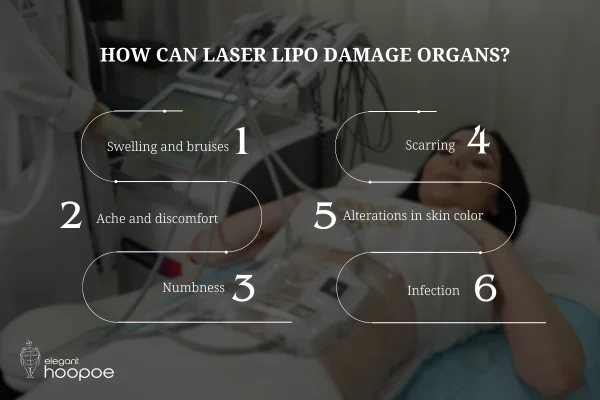Can Laser Lipo Damage Organs? Risks & Safety Tips You Should Know
Wondering can laser lipo damage organs? While generally safe, improper technique or equipment malfunction can pose risks. Here’s what you need to know:
- Rare but possible risks – Internal burns, tissue damage, or infection if performed incorrectly.
- Common side effects – Swelling, bruising, numbness, and skin discoloration.
- Minimizing risks – Choose an experienced, certified professional and follow pre- and post-care instructions.
- Safe techniques – Non-invasive laser lipo has lower risks than invasive procedures.
By selecting a reputable clinic and following safety guidelines, you can reduce the likelihood of complications and achieve optimal results safely!
Laser liposuction, a popular cosmetic procedure that claims to offer targeted fat removal and body contouring, has gained significant attention in recent years. While many individuals are drawn to the promise of a slimmer silhouette with minimal downtime, questions have been raised about the potential risks associated with this treatment: Can Laser Lipo damage organs? What are the lipo laser side effects? This is one of the most asked questions by people considering this procedure.
In this article, we delve into how laser liposuction works, explore the potential laser liposuction risks, and learn how to reduce the chances of complications like organ damage.

What Is Laser Liposuction and How Does It Work?
Laser liposuction, or laser lipo, is a cosmetic treatment that uses laser technology to break down fat cells in targeted body areas, making it easier to remove excess fat. During the procedure, a laser fiber is inserted through a small incision to deliver energy directly to fat cells, causing them to rupture and eventually be eliminated naturally.
Popularity and Use in Cosmetic Procedures
Laser lipo has gained popularity in cosmetic procedures due to its minimally invasive nature and ability to provide more precise results than traditional liposuction methods.
You might also like to know about how much laser lipo costs. You have a lot to learn about the average price paid for the treatment and the factors influencing the overall cost of the treatment.
Types of Laser Lipolysis
What plastic surgeons can do is:
- Minimally Invasive Laser Lipolysis: This procedure requires a small cut in the skin for the laser applicator to be inserted.
- Noninvasive Laser Lipolysis: This procedure avoids the need for skin incisions by applying the laser device to the top layer of the skin.

Who Qualifies as a Good Candidate for Laser Lipo?
Is laser lipo therapy the best option for you? The National Center for Biotechnology Information (NCBI) highlights these ideal characteristics:
- Initial Treatment Body Weight: Lipolaser is not a cure for obesity, even though it does an excellent job of reducing fat in specific places and sculpting your figure. Still, you should focus on weight loss and BMI reduction.
- High Overall Health: The best candidates are healthy individuals with detachable fat pockets.
- Not Being Pregnant: Even though it’s a noninvasive method, the treatment should be delayed until after the baby is born.
- Targeted areas: The abdomen, hips, thighs, neck, chin, waist, and other specific areas resistant to diet and exercise are the best targets for lipolysis.
What Are the Common Laser Lipo Side Effects?
Laser liposuction, while generally considered safe, does carry potential risks, including organ damage. Although rare, improper technique or equipment malfunction can cause burns or injury to nearby tissues and organs. That’s why it’s crucial to choose a highly experienced and certified plastic surgeon to minimize such risks.

How Can Laser Lipo Damage Organs?
Laser lipolysis’s risks are generally low, and side effects are rare. However, internal organ damage is a potential risk if the procedure is done incorrectly. You should talk to your plastic surgeon about the potential hazards and make sure the clinic follows safety protocols.
Key safety concerns include:
Burns from misplaced laser beams
Tissue or organ damage from poor technique
Malfunctioning equipment
Laser liposuction carries risks, such as organ damage; choose an experienced clinic like elegant hoopoe for safe results.
How to Reduce the Risk of Organ Damage with Laser Lipo?
| Do’s | Don’ts |
| 1. Speak with a licensed medical professional | 1. Don’t neglect past medical histories and current conditions |
| 2. Get a thorough medical assessment | 2. Don’t pick a lipolaser clinic just because of the cost. |
| 3. Enquire about the advantages and dangers | 3. Don’t forget the pre-procedure guidelines |
| 4. Adhere to pre-treatment instructions | 4. Don’t exceed your food intake before the procedure |
| 5. Tell your doctor about all the medications you take | 5. Don’t smoke or drink before therapy |
| 6. Take pictures of the before and after | 6. Don’t anticipate results right away |
| 7. Dress comfortably on the day of treatment | 7. Don’t try strenuous activities right after the procedure |
| 8. Make sure you drink enough water | 8. Don’t ignore the aftercare instructions |
| 9. Pay attention to the after-treatment care guidelines | 9. Don’t give the treated area direct sunlight exposure |
| 10. Go to all scheduled follow-up visits | 10. Don’t ignore any indications of problems |
| 11. Maintain a healthy lifestyle if you want long-lasting effects | 11. Don’t forget regular exercise and eat a balanced diet |
| 12. Always inquire about aftercare treatments | 12. Don’t use over-the-counter medicine without a prescription |
Related article: Neck Lift Without Surgery – What Are Your Options?
Final Thoughts: Is Laser Lipo Worth the Risk?
While laser lipo is a popular non-invasive procedure for fat reduction, ensuring the safety of patients and protecting organ health should always remain a top priority. By staying vigilant, informed, and proactive, practitioners and patients can work together to promote the safe and effective use of lipolaser for aesthetic purposes.
In conclusion, while laser liposuction offers a safe and effective solution for body contouring, it is essential to consider this procedure’s potential risks and side effects. Common laser lipo side effects include swelling, bruising, and temporary numbness in the treated areas. More serious but less common risks involve infection, scarring, and changes in skin pigmentation.
Individuals can navigate cosmetic procedures with greater awareness and confidence by prioritizing safety measures, consulting with experienced professionals, and understanding both the benefits and side effects of laser lipo technology. As research continues to evolve in cosmetic surgery, staying informed about the impact of laser lipo on organs (for example, organ damage) is crucial for making well-informed decisions about undergoing such treatments.








